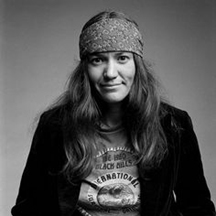Cris Williamson (born 1947) is an American feminist singer-songwriter, who achieved fame as a recording artist, and who was a pioneer as a visible lesbian political activist, during a time when few who were not connected to the Lesbian community were aware of Gay and Lesbian issues. Williamson's music and insight has served as a catalyst for change in the creation of women-owned record companies in the 1970s. Using her musical talents, networking with other lesbian artists of musical quality, and her willingness to represent those who did not yet feel safe in speaking for themselves, Williamson is remembered by many in the LGBT community for her contributions, both artistically, and politically, and continues to be a role model for a younger generation hoping to address concerns and obtain recognition for achievements specific to people who have historically been ignored. (More from Wikipedia)
In the article about Cris Williamson in Allmusic, William Ruhlmann offers this concise introduction: "Just as baseball historians can only speculate about how players in the old Negro leagues would have fared in the absence of segregation in the major leagues prior to the arrival of Jackie Robinson in 1947, so music historians may ponder what status Cris Williamson might have assumed if she had emerged at a time when admitted homosexuals were not subject to exclusion from major record labels. By the 1990's, openly gay women artists Melissa Etheridge, Indigo Girls, and k.d. lang were able to maintain major-label contracts and sell records in the millions (although none of them had proclaimed their sexual orientation when they were signed in the 1980's)." * * *
Cris Williamson grew up in Deadwood, South Dakota as the daughter of a forest ranger; their home had no electricity, so her phonograph was of the wind-up variety. The Nuttal & Mann's Saloon in Deadwood is the place where Wild Bill Hickok was gunned down during a poker game; the cards he was holding – a pair of aces and a pair of eights – became known as the "dead man's hand" thereafter, particularly (as in this case) when the cards are all in the black suits. My father and I each had a shot at the saloon many years ago while much of our family was on a Western tour.
After moving to Sheraton, Wyoming, Cris Williamson began performing on a local radio station. Three listeners who were impressed with her remarkable talent spearheaded the formation of a small record company, Avanti Records that released her first album in 1964, The Artistry of Cris Williamson when she was just 16. After all 500 copies were sold out, two more albums followed, A Step at a Time (1965) and The World Around Cris Williamson (1966). Her full-fledged debut album, Cris Williamson was released on Ampex Records in 1971; her vocal stylings were so similar to those of Judy Collins that Cris was sometimes called "Judy Jr.". After Cris Williamson acknowledged that she was a lesbian, however, she was quickly relegated to the sidelines.
* * *
Another lesbian singer-songwriter Meg Christian once interviewed Cris Williamson, and this connection led to the creation of Olivia Records, the foremost record label in what became known as "women's music". Their first release was a single in 1973, with Meg singing the Carole King/Gerry Goffin song "Lady" on one side and Cris singing her own song, "If it Weren't for the Music" on the other.
There is a strong feminist stance in women's music, however; and that was largely absent from the music scene in the mid-1970's, Helen Reddy's "I Am Woman" (1972) notwithstanding. Meg Christian also covers one of Cris Williamson's songs, "Joanna"; a single lyric in "Joanna", "I need to touch you" was the only hint of lesbianism on the Cris Williamson album.
* * *
The Changer and the Changed (1975) was Olivia Records' second album release, and this album by Cris Williamson quickly became the biggest seller in women's music, eventually selling 500,000 copies. Allmusic gives the record its highest rating (five stars), and Stewart Mason has a rave review on the website: "The simple but rich arrangements set Williamson's glorious voice and piano against strings, flute, and Jacqueline Robbins' jazz-inflected fretless bass, giving the album a timeless sound and putting the focus entirely on the songs and Williamson's elegantly passionate performance of them."
Behind the scenes, Olivia Records started to put the full weight of its philosophy into place on this album: To the extent possible, their work was to be in women's hands from start to finish. As in most fields during this time period, women were regularly excluded in the music industry from working as backing musicians, producers, arrangers, engineers, etc. Thus, besides performing on guitar, Meg Christian produced The Changer and the Changed; other contributors later released women's music albums, such as Margie Adam. June Millington, previously in the all-female rock band Fanny, provided backing vocals and also played drums, acoustic and electric guitar, slide guitar, and keyboards; Millington shows up on later Cris Wiliamson releases also. In all, Allmusic lists 50 people in the credits for The Changer and the Changed, with the vast majority being women.
Cris Williamson and Meg Christian celebrated the 10th anniversary of the founding of Olivia Records by holding a joint concert at Carnegie Hall with several other women's-music stalwarts, as documented in the double album release, Meg/Cris at Carnegie Hall.
* * *
In addition to her numerous women's music albums, Cris Williamson had an interesting side project in 1982 with a children's album called Lumière. Entitled "a science-fantasy fable", the album is primarily a forum for Williamson's songs that are tied together with a simple fantasy that turns out to be a dream. The album won a prestigious Parents' Choice Award.
Tret Fure, a multi-talented women's music artist was the engineer on the Cris Williamson album Lumière, as well as providing musical backing; the two became domestic partners.
(January 2014)
Cris Williamson grew up in Deadwood, South Dakota as the daughter of a forest ranger; their home had no electricity, so her phonograph was of the wind-up variety. The Nuttal & Mann's Saloon in Deadwood is the place where Wild Bill Hickok was gunned down during a poker game; the cards he was holding – a pair of aces and a pair of eights – became known as the "dead man's hand" thereafter, particularly (as in this case) when the cards are all in the black suits. My father and I each had a shot at the saloon many years ago while much of our family was on a Western tour.
After moving to Sheraton, Wyoming, Cris Williamson began performing on a local radio station. Three listeners who were impressed with her remarkable talent spearheaded the formation of a small record company, Avanti Records that released her first album in 1964, The Artistry of Cris Williamson when she was just 16. After all 500 copies were sold out, two more albums followed, A Step at a Time (1965) and The World Around Cris Williamson (1966). Her full-fledged debut album, Cris Williamson was released on Ampex Records in 1971; her vocal stylings were so similar to those of Judy Collins that Cris was sometimes called "Judy Jr.". After Cris Williamson acknowledged that she was a lesbian, however, she was quickly relegated to the sidelines.
* * *
Another lesbian singer-songwriter Meg Christian once interviewed Cris Williamson, and this connection led to the creation of Olivia Records, the foremost record label in what became known as "women's music". Their first release was a single in 1973, with Meg singing the Carole King/Gerry Goffin song "Lady" on one side and Cris singing her own song, "If it Weren't for the Music" on the other.
There is a strong feminist stance in women's music, however; and that was largely absent from the music scene in the mid-1970's, Helen Reddy's "I Am Woman" (1972) notwithstanding. Meg Christian also covers one of Cris Williamson's songs, "Joanna"; a single lyric in "Joanna", "I need to touch you" was the only hint of lesbianism on the Cris Williamson album.
* * *
The Changer and the Changed (1975) was Olivia Records' second album release, and this album by Cris Williamson quickly became the biggest seller in women's music, eventually selling 500,000 copies. Allmusic gives the record its highest rating (five stars), and Stewart Mason has a rave review on the website: "The simple but rich arrangements set Williamson's glorious voice and piano against strings, flute, and Jacqueline Robbins' jazz-inflected fretless bass, giving the album a timeless sound and putting the focus entirely on the songs and Williamson's elegantly passionate performance of them."
Behind the scenes, Olivia Records started to put the full weight of its philosophy into place on this album: To the extent possible, their work was to be in women's hands from start to finish. As in most fields during this time period, women were regularly excluded in the music industry from working as backing musicians, producers, arrangers, engineers, etc. Thus, besides performing on guitar, Meg Christian produced The Changer and the Changed; other contributors later released women's music albums, such as Margie Adam. June Millington, previously in the all-female rock band Fanny, provided backing vocals and also played drums, acoustic and electric guitar, slide guitar, and keyboards; Millington shows up on later Cris Wiliamson releases also. In all, Allmusic lists 50 people in the credits for The Changer and the Changed, with the vast majority being women.
Cris Williamson and Meg Christian celebrated the 10th anniversary of the founding of Olivia Records by holding a joint concert at Carnegie Hall with several other women's-music stalwarts, as documented in the double album release, Meg/Cris at Carnegie Hall.
* * *
In addition to her numerous women's music albums, Cris Williamson had an interesting side project in 1982 with a children's album called Lumière. Entitled "a science-fantasy fable", the album is primarily a forum for Williamson's songs that are tied together with a simple fantasy that turns out to be a dream. The album won a prestigious Parents' Choice Award.
Tret Fure, a multi-talented women's music artist was the engineer on the Cris Williamson album Lumière, as well as providing musical backing; the two became domestic partners.
(January 2014)















